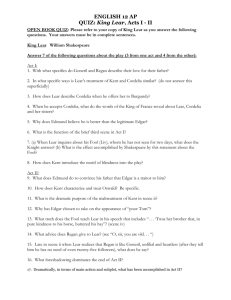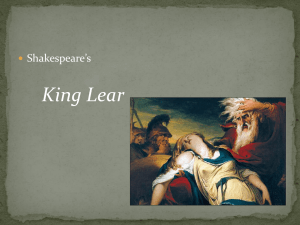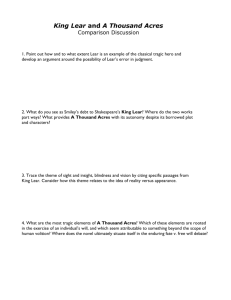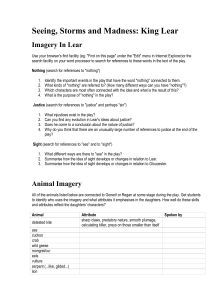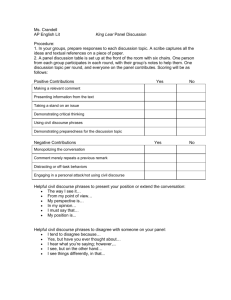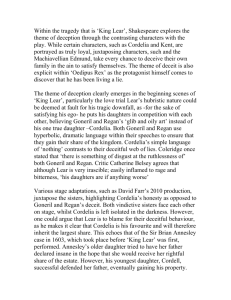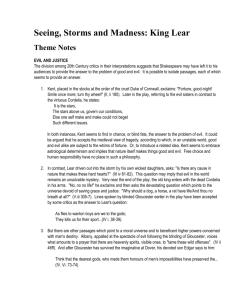King Lear essay
advertisement
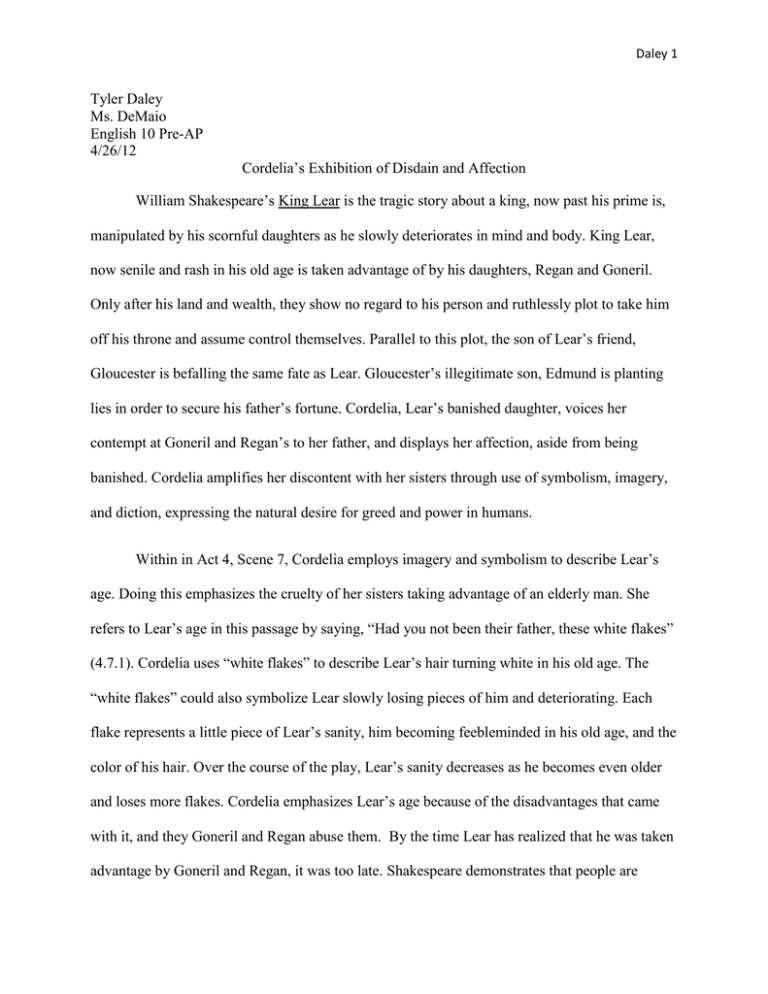
Daley 1 Tyler Daley Ms. DeMaio English 10 Pre-AP 4/26/12 Cordelia’s Exhibition of Disdain and Affection William Shakespeare’s King Lear is the tragic story about a king, now past his prime is, manipulated by his scornful daughters as he slowly deteriorates in mind and body. King Lear, now senile and rash in his old age is taken advantage of by his daughters, Regan and Goneril. Only after his land and wealth, they show no regard to his person and ruthlessly plot to take him off his throne and assume control themselves. Parallel to this plot, the son of Lear’s friend, Gloucester is befalling the same fate as Lear. Gloucester’s illegitimate son, Edmund is planting lies in order to secure his father’s fortune. Cordelia, Lear’s banished daughter, voices her contempt at Goneril and Regan’s to her father, and displays her affection, aside from being banished. Cordelia amplifies her discontent with her sisters through use of symbolism, imagery, and diction, expressing the natural desire for greed and power in humans. Within in Act 4, Scene 7, Cordelia employs imagery and symbolism to describe Lear’s age. Doing this emphasizes the cruelty of her sisters taking advantage of an elderly man. She refers to Lear’s age in this passage by saying, “Had you not been their father, these white flakes” (4.7.1). Cordelia uses “white flakes” to describe Lear’s hair turning white in his old age. The “white flakes” could also symbolize Lear slowly losing pieces of him and deteriorating. Each flake represents a little piece of Lear’s sanity, him becoming feebleminded in his old age, and the color of his hair. Over the course of the play, Lear’s sanity decreases as he becomes even older and loses more flakes. Cordelia emphasizes Lear’s age because of the disadvantages that came with it, and they Goneril and Regan abuse them. By the time Lear has realized that he was taken advantage by Goneril and Regan, it was too late. Shakespeare demonstrates that people are Daley 2 naturally greedy and will not hesitate to prey on the weak to achieve their own personal goals. The natural desire to stand above the rest can consume people, just as it did to Goneril and Regan. In a world where status, power, and fortune rule all, those with nothing stand at the bottom of society. It is the prospect of this nothingness that compels people to behave like this and to satisfy their own selfish goals. Additionally, Cordelia is able to express her discontent of her sisters’ actions through the use of diction. Cordelia uses words with a negative connotation to describe the way in which Lear was treated. Cordelia’s diction is enhanced through the fact the Lear is royalty and for him to be treated like this is rude and disrespectful. She shows this by saying, “To hovel thee with swine and rogues forlorn, In short and musty straw? Alack, alack! ‘Tis wonder that thy life and wits at once Had not conclude all, He wakes; speak to him” (4.7.10-13). Lear, who is used to living in a castle his whole life, was “hovelled with swine and rogues forlorn.” He is taken from his comfortable, high class lifestyle, and then placed in an abandoned house with animals and vagrants. This itself would be considered disrespectful to anyone, but is made even worse due to the fact that the he is a king. Also, Lear is accustomed to silk and fine linens, but when removed from his castle, is forced to sleep in broken and dirty straw, a bed hardly fit for anyone. Cordelia also displays affection in this passage with, “Alack, alack! ‘Tis wonder that thy life and wits at once Had not conclude all.” She shows that she cares for her father’s health by exclaiming her surprise that he did not die while in the abandoned hovel. Through this, Shakespeare shows that people take their life for granted. Cordelia believes that the conditions Lear had to live in were horrendous, but does not realize there are people who have it even worse than that and she should have been thankful that Lear did not have to sleep outside. People do not realize that life is a privilege, not a right. People just assume that their life is something they receive as a birth Daley 3 right, but it is more than that. Life is a gift and should be treated as such, not taken for granted, assuming that it will always be there. Cordelia also condemns her sisters’ actions by showing sympathy for Lear, showing that she believes the way her father was treated was wrong. She conveys her sympathy by feeling sorry for Lear after he is thrown out into the storm with: Was this a face To be opposed against the warring winds? To stand against the deep dread-bolted thunder? In the most terrible and nimble stroke Of Quick, cross lightning? to watch-poor perdu!- (4.7.2-6). Cordelia uses “most terrible and nimble stroke” to describe the intensity and severity of this storm. For anyone to be out in this storm, especially an elderly person such as Lear, it would surely spell doom. Cordelia sympathizes with Lear by saying “to watch-poor perdu!” She feels sad that Lear had to endure that storm and does not believe that he should have had to. The fact that Cordelia feels sorry for Lear shows that she does not think that what her sisters did was right. Cordelia is horrified at her sisters’ actions and feels sorry for Lear which shows that Cordelia still loves him regardless of what he did to her. Through Cordelia’s sympathy and condemning of her sisters, Shakespeare shows that it is important to support and love you family, because no matter what, they will always be there. People cannot let petty arguments come between them, especially when it comes to family, because in the end, the only people that can be really counted on is family. In summary, Shakespeare’s King Lear is a story of how a once great king is taken advantage of by his daughters and once he realizes what has happened, it is too late. Cordelia denounces her sisters’ actions through use of imagery, symbolism, and sympathy. Through Daley 4 Cordelia, Shakespeare shows that people are naturally greedy, take things for granted, and that family is what is most important. Shakespeare uses Lear’s mistakes as a way to convey the natural behaviors of people and to teach everyone a life lesson.

